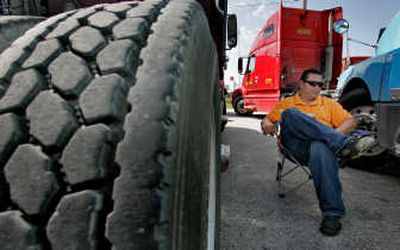Truckers protest soaring fuel prices

ATLANTA – A convoy protesting high diesel prices pulled out of a truck stop south of Atlanta about 30 strong, and it got a lot stronger.
By the time the truckers reached a section of Interstate 285 east of the city Tuesday morning, there were about three miles of tractor-trailers, headlights on, caution lights flashing, puttering along at 20 mph.
“We picked up drivers all along the way,” said Danny Ashley, an independent driver who organized the protest. “A lot of drivers rode by and didn’t stop, but we got a lot of owner-operators who joined in.”
Independent truckers across the country protested fuel prices by pulling off the road or slowing to a crawl. Participation was scattered in the loosely organized protests, fed by Internet postings and CB talk, and the slow-speed demonstrations might have gone unnoticed in places where traffic was bad already.
Truckers hoped the action might pressure President Bush to stabilize prices by using the nation’s oil reserves.
“The gas prices are too high,” said Lamont Newberne, a trucker from Wilmington, N.C., who along with 200 drivers protested at a New Jersey Turnpike service area. “We don’t make enough money to pay our bills and take care of our family.”
On the Turnpike, southbound rigs “as far as the eye can see” staged a short lunchtime protest by moving about 20 mph near Newark, jamming traffic on one of the nation’s most heavily traveled highways, authorities said.
Outside Chicago, three truck drivers were ticketed for impeding traffic on Interstate 55, driving three abreast at low speeds, the state police said.
Near Florida’s Port of Tampa, more than 50 tractor-trailer rigs sat idle as their drivers demanded that contractors pay them more to cover their fuel and other costs.
Major trucking companies were not on board, and Teamsters union officials and the Owner-Operator Independent Drivers Association denied organizing the protests.
Federal law prohibits the association from calling for a strike because it is a trade association.
Clayton Boyce, spokesman for the American Trucking Association, said diesel prices are the worst he’s seen but said his organization does not support or condone the strike.
His group is pushing for a number of measures to keep the prices down or to otherwise help truckers, including allowing exploration of oil-rich areas of the U.S. that are now off limits and setting a 65 mph national speed limit.
Newberne, one of the New Jersey protesters, said a typical run carrying produce from Lakeland, Fla., to the Hunt’s Point Market in the Bronx, N.Y., cost $600 to $700 a year ago. It now runs him $1,000.
Charles Rotenbarger, 49, a trucker from Columbus, Ohio, said he felt helpless.
“The oil company is the boss. What are we going to be able to do about it?” said Rotenbarger, who was at a truck stop at Baldwin, Fla., about 20 miles west of Jacksonville. “The whole world economy is going to be controlled by the oil companies. There’s nothing we can do about it.”